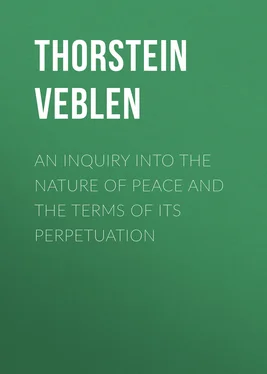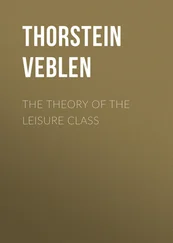Thorstein Veblen - An Inquiry into the Nature of Peace and the Terms of Its Perpetuation
Здесь есть возможность читать онлайн «Thorstein Veblen - An Inquiry into the Nature of Peace and the Terms of Its Perpetuation» — ознакомительный отрывок электронной книги совершенно бесплатно, а после прочтения отрывка купить полную версию. В некоторых случаях можно слушать аудио, скачать через торрент в формате fb2 и присутствует краткое содержание. Жанр: foreign_antique, Политика, Юриспруденция, foreign_edu, на английском языке. Описание произведения, (предисловие) а так же отзывы посетителей доступны на портале библиотеки ЛибКат.
- Название:An Inquiry into the Nature of Peace and the Terms of Its Perpetuation
- Автор:
- Жанр:
- Год:неизвестен
- ISBN:нет данных
- Рейтинг книги:5 / 5. Голосов: 1
-
Избранное:Добавить в избранное
- Отзывы:
-
Ваша оценка:
- 100
- 1
- 2
- 3
- 4
- 5
An Inquiry into the Nature of Peace and the Terms of Its Perpetuation: краткое содержание, описание и аннотация
Предлагаем к чтению аннотацию, описание, краткое содержание или предисловие (зависит от того, что написал сам автор книги «An Inquiry into the Nature of Peace and the Terms of Its Perpetuation»). Если вы не нашли необходимую информацию о книге — напишите в комментариях, мы постараемся отыскать её.
An Inquiry into the Nature of Peace and the Terms of Its Perpetuation — читать онлайн ознакомительный отрывок
Ниже представлен текст книги, разбитый по страницам. Система сохранения места последней прочитанной страницы, позволяет с удобством читать онлайн бесплатно книгу «An Inquiry into the Nature of Peace and the Terms of Its Perpetuation», без необходимости каждый раз заново искать на чём Вы остановились. Поставьте закладку, и сможете в любой момент перейти на страницу, на которой закончили чтение.
Интервал:
Закладка:
And the mercy that we gave them
Was to sink them in the sea,
Down on the coast of High Barbarie.
No doubt, it will be accepted as an axiomatic certainty that the establishment of a commonwealth after the fashion of the Icelandic Republic, without coercive authority or provision for the common defense, and without a sense of subordination or collective responsibility among its citizens, would be out of all question under existing circumstances of politics and international trade. Nor would such a commonwealth be workable on the scale and at the pace imposed by modern industrial and commercial conditions, even apart from international jealousy and ambitions, provided the sacred rights of ownership were to be maintained in something like their current shape. And yet something of a drift of popular sentiment, and indeed something of deliberate endeavour, setting in the direction of such a harmless and helpless national organisation is always visible in Western Europe, throughout modern times; particularly through the eighteenth and the early half of the nineteenth centuries; and more particularly among the English-speaking peoples and, with a difference, among the French. The Dutch and the Scandinavian countries answer more doubtfully to the same characterisation.
The movement in question is known to history as the Liberal, Rationalistic, Humanitarian, or Individualistic departure. Its ideal, when formulated, is spoken of as the System of Natural Rights; and its goal in the way of a national establishment has been well characterised by its critics as the Police State, or the Night-Watchman State. The gains made in this direction, or perhaps better the inroads of this animus in national ideals, are plainly to be set down as a shift in the direction of peace and amity; but it is also plain that the shift of ground so initiated by this strain of sentiment has never reached a conclusion and never has taken effect in anything like an effectual working arrangement. Its practical consequences have been of the nature of abatement and defection in the pursuit of national ambitions and dynastic enterprise, rather than a creative work of installing any institutional furniture suitable to its own ends. It has in effect gone no farther than what would be called an incipient correction of abuses. The highest rise, as well as the decline, of this movement lie within the nineteenth century.
In point of time, the decay of this amiable conceit of laissez-faire in national policy coincides with the period of great advance in the technology of transport and communication in the nineteenth century. Perhaps, on a larger outlook, it should rather be said that the run of national ambitions and animosities had, in the eighteenth and nineteenth centuries, suffered a degree of decay through the diffusion of this sentimental predilection for Natural Liberty, and that this decline of the manlier aspirations was then arrested and corrected by help of these improvements in the technological situation; which enabled a closer and more coercive control to be exercised over larger areas, and at the same time enabled a more massive aggregate of warlike force to strike more effectively at a greater distance. This whole episode of the rise and decline of laissez-faire in modern history is perhaps best to be conceived as a transient weakening of nationalism, by neglect; rather than anything like the growth of a new and more humane ideal of national intercourse. Such would be the appraisal to be had at the hands of those who speak for a strenuous national life and for the arbitrament of sportsmanlike contention in human affairs. And the latterday growth of more militant aspirations, together with the more settled and sedulous attention to a development of control and of formidable armaments, such as followed on through the latter half of the nineteenth century, would then be rated as a resumption of those older aims and ideals that had been falling somewhat into abeyance in the slack-water days of Liberalism.
There is much to be said for this latter view; and, indeed, much has been said for it, particularly by the spokesmen of imperialist politics. This bias of Natural Liberty has been associated in history with the English-speaking peoples, more intimately and more extensively than with any other. Not that this amiable conceit is in any peculiar degree a race characteristic of this group of peoples; nor even that the history of its rise and decline runs wholly within the linguistic frontiers indicated by this characterisation. The French and the Dutch have borne their share, and at an earlier day Italian sentiment and speculation lent its impulsion to the same genial drift of faith and aspiration. But, by historical accident, its center of gravity and of diffusion has lain with the English-speaking communities during the period when this bias made history and left its impress on the institutional scheme of the Western civilisation. By grace of what may, for the present purpose, be called historical accident, it happens that the interval of history during which the bias of Natural Liberty made visible headway was also a period during which these English-speaking peoples, among whom its effects are chiefly visible, were relatively secure from international disturbance, by force of inaccessibility. Little strain was put upon their sense of national solidarity or national prowess; so little, indeed, that there was some danger of their patriotic animosity falling into decay by disuse; and then they were also busy with other things. Peaceable intercourse, it is true, was relatively easy, active and far-reaching—eighteenth and nineteenth centuries—as compared with what had been the case before that time; but warlike intercourse on such a scale as would constitute a substantial menace to any large nation was nearly out of the question, so far as regards the English-speaking peoples. The available means of aggression, as touches the case of these particular communities, were visibly and consciously inadequate as compared with the means of defense. The means of internal or intra-national control or coercion were also less well provided by the state of the arts current at that time than the means of peaceable intercourse. These means of transport and communication were, at that stage of their development, less well suited for the purposes of far-reaching warlike strategy and the exercise of surveillance and coercion over large spaces than for the purposes of peaceable traffic.
But the continued improvement in the means of communication during the nineteenth century presently upset that situation, and so presently began to neutralise the geographical quarantine which had hedged about these communities that were inclined to let well enough alone. The increasing speed and accuracy of movement in shipping, due to the successful introduction of steam, as well as the concomitant increasing size of the units of equipment, all runs to this effect and presently sets at naught the peace barriers of sea and weather. So also the development of railways and their increasing availability for strategic uses, together with the far-reaching coordination of movement made possible by their means and by the telegraph; all of which is further facilitated by the increasing mass and density of population. Improvements in the technology of arms and armament worked to the like effect, of setting the peace of any community on an increasingly precarious footing, through the advantage which this new technology gave to a ready equipment and a rapid mobilisation. The new state of the industrial arts serviceable for warlike enterprise put an increasingly heavy premium on readiness for offense or defense, but more particularly it all worked increasingly to the advantage of the offensive. It put the Fabian strategy out of date, and led to the doctrine of a defensive offense.
Читать дальшеИнтервал:
Закладка:
Похожие книги на «An Inquiry into the Nature of Peace and the Terms of Its Perpetuation»
Представляем Вашему вниманию похожие книги на «An Inquiry into the Nature of Peace and the Terms of Its Perpetuation» списком для выбора. Мы отобрали схожую по названию и смыслу литературу в надежде предоставить читателям больше вариантов отыскать новые, интересные, ещё непрочитанные произведения.
Обсуждение, отзывы о книге «An Inquiry into the Nature of Peace and the Terms of Its Perpetuation» и просто собственные мнения читателей. Оставьте ваши комментарии, напишите, что Вы думаете о произведении, его смысле или главных героях. Укажите что конкретно понравилось, а что нет, и почему Вы так считаете.












